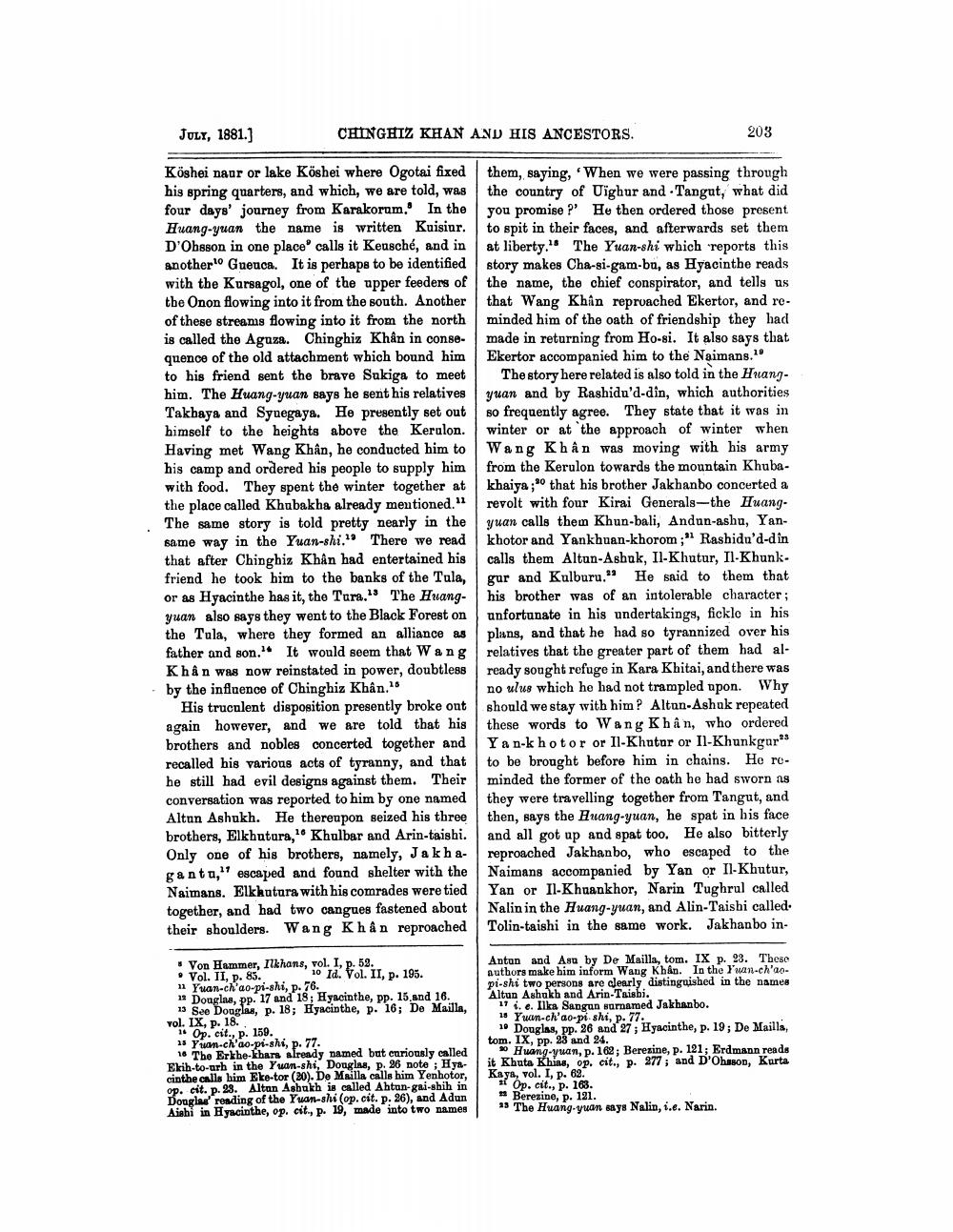________________
JULY, 1881.1
CHINGHIZ KHAN AND HIS ANCESTORS.
203
Köshei naur or lake Köshei where Ogotai fixed his spring quarters, and which, we are told, was four days' journey from Karakorum. In the Huang-yuan the name is written Kuisior. D'Obsson in one place calls it Keusché, and in another Guenca. It is perhaps to be identified with the Kursagol, one of the upper feeders of the Onon flowing into it from the south. Another of these streams flowing into it from the north is called the Aguza. Chinghiz Khan in consequence of the old attachment which bound him to his friend sent the brave Sukiga to meet him. The Huang-yuan says he sent his relatives Takhaya and Synegaya. He presently set out himself to the heights above the Keralon. Having met Wang Khân, he conducted him to his camp and ordered his people to supply him with food. They spent the winter together at the place called Khubakha already mentioned. The same story is told pretty nearly in the same way in the Yuan-shi." There we read that after Chinghiz Khân had entertained his friend he took him to the banks of the Tula, or as Hyacinthe has it, the Tora." The Huangyuan also says they went to the Black Forest on the Tula, where they formed an alliance as father and son." It would seem that Wang Khâ n was now reinstated in power, doubtless by the influence of Chinghiz Khân.
His truculent disposition presently broke ont again however, and we are told that his brothers and nobles concerted together and recalled his various acts of tyranny, and that he still had evil designs against them. Their conversation was reported to him by one named Altan Ashukh. He thereupon seized his three brothers, Elkhutura," Khulbar and Arin-taishi. Only one of his brothers, namely, Jakhaganta," escaped and found shelter with the Naimans. Elkkutura with his comrades were tied together, and had two cangues fastened about their shoulders. Wang Khân reproached
them, saying, "When we were passing through the country of Uighur and . Tangut, what did you promise ?' He then ordered those present to spit in their faces, and afterwards set them at liberty." The Yuan-shi which reports this story makes Cha-si-gam-bu, as Hyacinthe reads the name, the chief conspirator, and tells us that Wang Khin reproached Ekertor, and reminded him of the oath of friendship they had made in returning from Ho-si. It also says that Ekertor accompanied him to the Naimans."
The story here related is also told in the Huangyuan and by Rashidu'd-din, which authorities so frequently agree. They state that it was in winter or at the approach of winter when Wang Khân was moving with his army from the Kerulon towards the mountain Khubakhaiya , that his brother Jakhanbo concerted a revolt with four Kirai Generals--the Huangyuan calls them Khun-bali, Andan-ashu, Yankhotor and Yankhuan-khorom;" Rashidu'd-dîn calls them Altun-Ashuk, Il-Khutur, Il-Khunk. gur and Kulburu." He said to them that his brother was of an intolerable character; unfortunate in his undertakings, ficklo in his plans, and that he had so tyrannized over his relatives that the greater part of them had already sought refuge in Kara Khitai, and there was no ulus which he had not trampled upon. Why should we stay with him? Altun-Ashok repeated these words to Wang Khân, who ordered Yan-k hotor or Il-Khutar or Il-Khunkgar" to be brought before him in chains. He reminded the former of the oath he had sworn as they were travelling together from Tangut, and then, says the Huang-yuan, he spat in his face and all got up and spat too. He also bitterly reproached Jakhanbo, who escaped to the Naimans accompanied by Yan or Il-Khutur, Yan or Il-Khaankhor, Narin Tughrul called Nalin in the Huang-yuan, and Alin-Taishi called. Tolin-taishi in the same work. Jakhanbo in
• Von Hammer, Ilkhans, vol. I, p. 52. • Vol. II, p. 83. 10 Id. Vol. II, p. 195. u Yuan-chao-pi-shi, p. 76. 1- Douglas, pp. 17 and 18: Hyacinthe, pp. 15 and 16.
13 See Douglas, p. 18; Hyacinthe, p. 16; De Mailla, vol. IX, p. 18. 1
* Op. cit., p. 159. » Ywon-ch'ao-pi-shi, p. 77.
16 The Erkhe-khan already named but curiously called Ekih-to-urh in the Yuan-shi, Dougla, p. 26 note ; Hya- cinthe calls him Eke-tor (20). De Mailla calls him Yenhotor, op. cit. p. 23. Altan Ashukh is called Abtan-gai-shih in Douglas' reading of the Yuan-shi (op. cit. p. 26), and Adun Aishi in Hyacinthe, op. cit., p. 19, made into two names
Anton and Asu by De Mailla, tom. IX p. 93. These authors make him inform Wang Khan. In the Yuan-ch'aopi-shi two persons are clearly distinguished in the names Altun Ashokh and Arin-Taishi.
11. e. Ilka Sangan surnamed Jakhanbo. 1 Yuan-ch'ao-pishi, p. 77.
10 Douglas, pp. 26 and 27 ; Hyacinthe, p. 19; De Maills, tom. IX, pp. 23 and 24.
Huang-yuan, p. 162; Beresine, p. 121; Erdmann reads it Khuta Khine, op. cit., p. 977; and D'Ohason, Karta 11 Op. cit., p. 163.
Berezine, p. 121. 13 The Huang-yuan saya Nalin, i.e. Narin.




